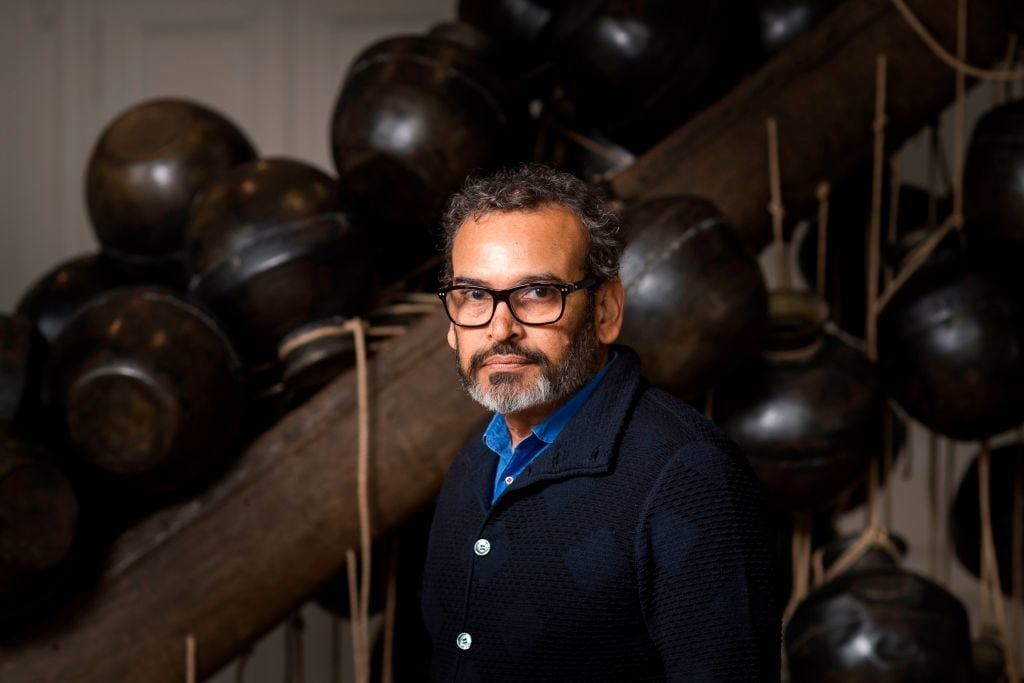As the #MeToo movement gains global steam, an Instagram account called HerdSceneAnd has taken a prominent and controversial stand against sexual harassment in the Indian art world. In 2018, the account began publishing anonymous accusations that the artist Subodh Gupta, known as “Delhi’s Damien Hirst,” and several other prominent men in the south Asian art scene had sexually harassed women.
Gupta issued a denial and, 10 months later, sued the anonymous Instagram account in a Delhi court for defamation and financial loss amounting to nearly $700,000. Then, just as swiftly as he’d taken legal action, he backed down from his demands.
After a few court hearings, lawyers for Gupta as well as for the Instagram account told the court in February that they would “resolve” the matter privately. Now, the terms of their settlement have come to light: The Instagram account holders will remove the two offending posts concerning Gupta’s alleged sexual harassment and would express “regret.” In return, Gupta said he would drop his defamation case and his demands for financial recompense, and wouldn’t push for the account holders to publicly testify.
The novel case has captured the media’s attention with all the questions it raises: How could an anonymous social media account be sued? Would the court demand that the whistleblowers behind it reveal their identities? Would the alleged victims then have to reveal themselves too? Why did Gupta wait so long to sue? Would other powerful men who were outed by HerdSceneAnd also begin to sue?
Although the account had posted allegations against several influential men—including former Sotheby’s managing director Gaurav Bhatia (who resigned following an inquiry), artist Riyaz Komu, and painter Jatin Das—so far Gupta is the only one who has sued.
Gupta’s lawsuit also raises broader concerns about a possible chilling effect on free speech. Early on, the Indian court indicated that the whistleblowers who run the Instagram account would have to reveal their identities. It also directed Google to remove a number of journalistic articles which had reported on the allegations against Gupta. The media outlets did not have a chance to defend their reporting.
Essentially, Gupta’s defamation case not only risked deterring women from speaking out about sexual harassment in the art world, it also asked for a judicial clampdown on whistleblowing and the free press.
As part of his case, Gupta demanded that Google globally de-index articles about him from its search results and asked Facebook, which owns Instagram, to take down the posts on HerdSceneAnd.
Google and Facebook hit back at Gupta, telling the Indian court that his demands would restrict free speech. Google said that granting Gupta’s request would “put an unreasonable restraint on the freedom of speech and expression on the internet as well as the freedom of the press.” Facebook went further to speak out in support of women outing alleged sexual predators, telling the court that Gupta’s demands could dissuade “potential victims of sexual harassment who share their experiences” and compromise their privacy.
The Indian Journalists Union also approached the court and asked to be made a party to the case on the grounds that journalists cannot be stopped from reporting on public figures even when the source is anonymous.
The newly established Culture Workers Forum asked the court to be made part of the case as well, explaining that the Indian art industry lacked the means to address sexual harassment: “when young artists choose to enter the industry, mechanisms such as imposing terms of service or establishing rules of conduct, are scarcely considered.”
Gupta, who makes massive sculptures out of stainless steel kitchen utensils, continues to show and sell his work internationally at galleries including Galleria Continua, Hauser and Wirth, and Nature Morte. Last June, a few months before he went to court, Gupta was invited to a fundraiser by the UK’s Prince Charles and Duchess Camilla, for which he made a giant brass elephant as a centerpiece of the event. After the allegations broke his art continued to be auctioned, raking in at least $530,000 in sales in the months before he sued.
As for the anonymous Instagram users who took on powerful men in the Indian art world, they are sticking it out. The Indian court allowed HerdSceneAnd to maintain its status as an unnamed whistleblower and the account is still active. Its most recent post, in August 2019, said: “We are still listening. It might seem quiet but do not for a second think our work is done and that we’ve moved on. We continue to be threatened and intimidated in subtle and not so subtle ways. Not all work can be in the public eye and many in the Indian Art World are hoping everyone will forget, and many have, but rest assured we all still remember.”






